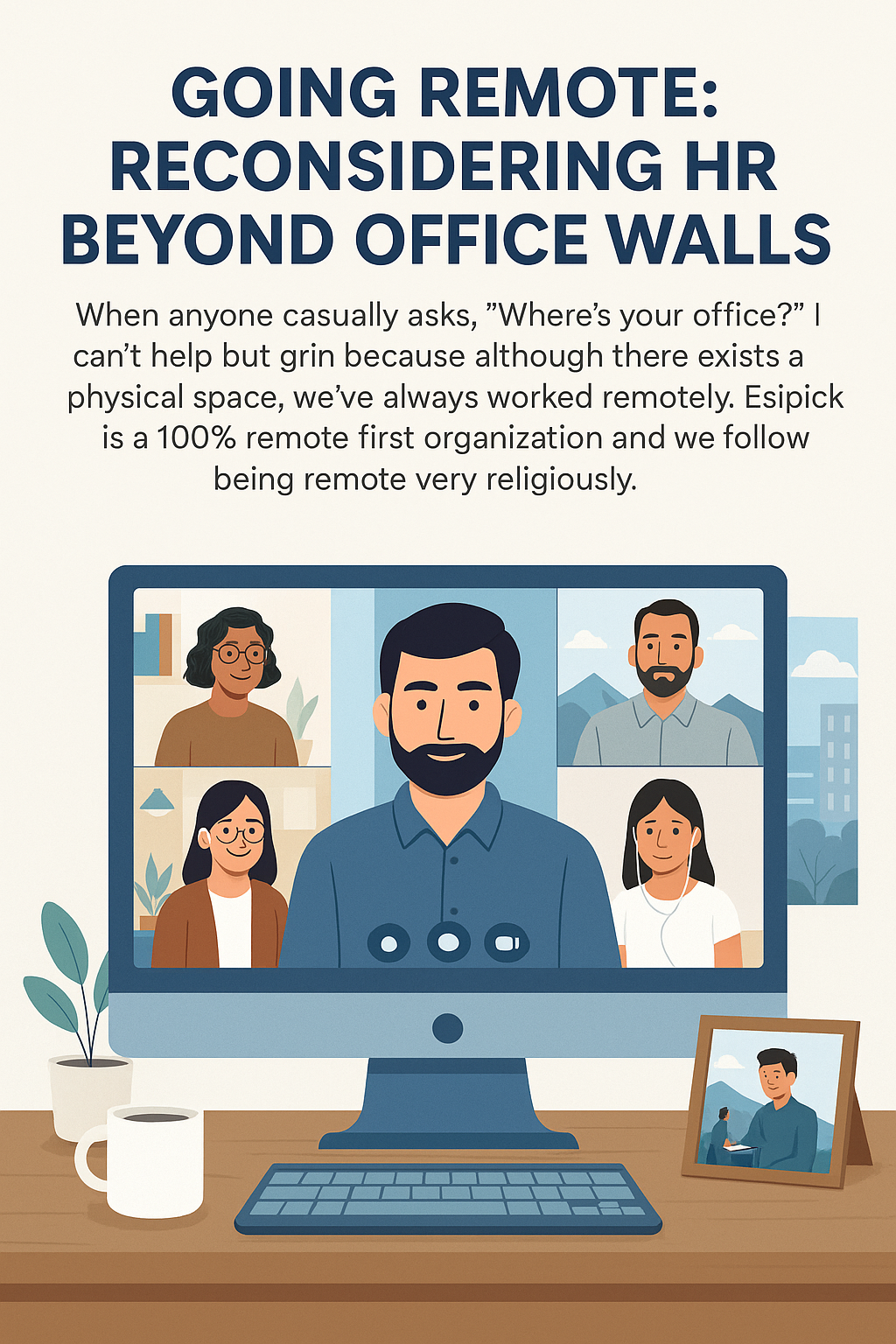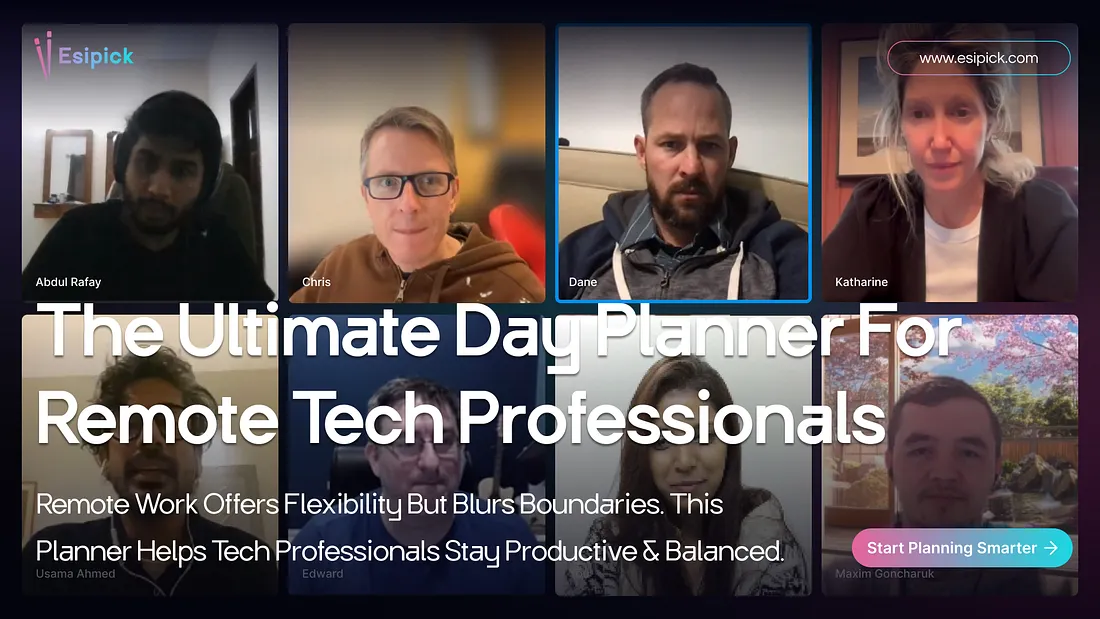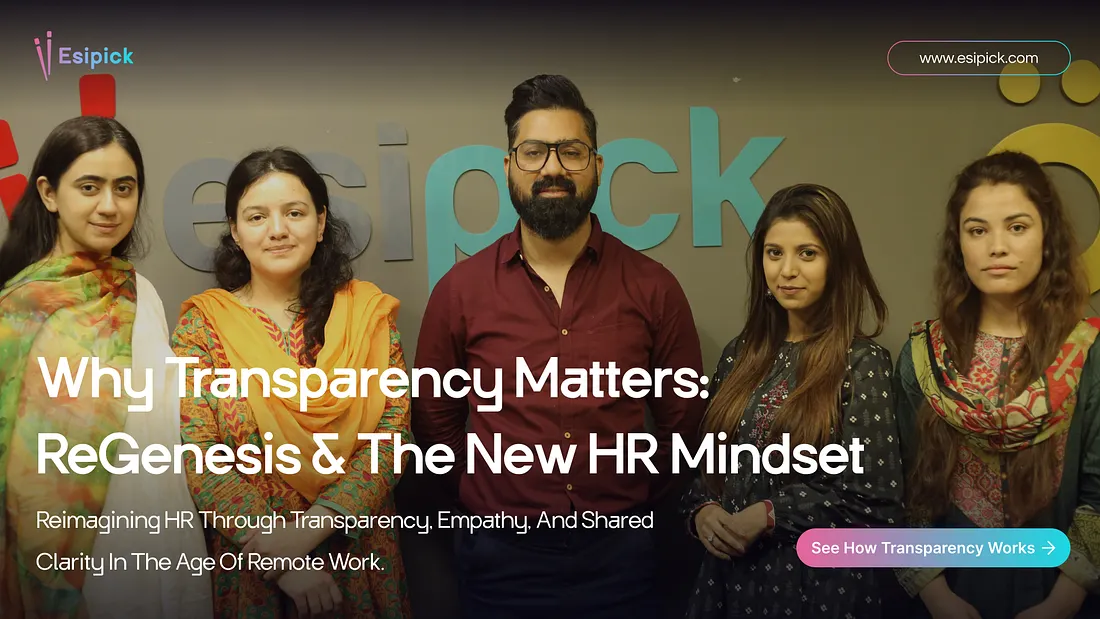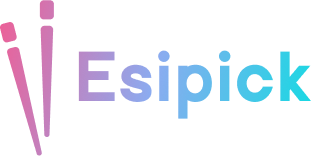Going Remote: Reconsidering HR Beyond Office Walls


Ramsha Ali Khan
Customer Success Manager
Ramsha Ali Khan
When anyone casually asks, “Where’s your office?” I can’t help but grin because although there exists a physical space but we’ve always worked remotely. Esipick is a 100% remote first organization and we follow being remote very religiously.
Since Day One, everyone was already everywhere, be it coffee shops in their cities, spare rooms in their houses, or just casually sitting below the mountains. So, my job in HR quickly rewrote its playbook.
Chapter 1: Culture, No Corridors Required
In a brick-and-mortar office, everyone is involved in one thing or another, be it casually chatting with your fellows, enjoying tea, taking team meetings or just vibing alone and it tends to nurture an atmosphere of familiarity.
Fully remote, these rituals diminish in remote set-up when everyone is distant. The team stares at the same four walls, sometimes theirs, never shared, and never pre-decorated with “us.” (This is where our Camera always open policy comes )
We spelled out the question: What does “still us” mean when real meet-and-greets are never guaranteed?
The answer boiled down to one five-letter word: Intent in culture, we found, is a conscious habit. So, we began to nourish it everyday:
- Having daily scrum calls
- Having townhall calls to ensure a better productive culture
- Improving Employee satisfaction forms distributed to extract anonymous data.
- Ensuring everyone is treated with special care on their birthdays.
Chapter 2: Hiring Across Cities
Going Remote Opened up a World of Opportunities For Us.
Our developer in Hunza sometimes codes with mountains in the backdrop, sending commits while literally surrounded by nature. I, in Lahore, often slip out to Contra Café, my favorite little spot to enjoy the buzz of the city while working. One of our teammates is based in Islamabad, splitting their days between quiet home offices and lively co-working spaces, while our designer thrives in Karachi’s vibrant creative energy.
This spread-out setup didn’t just expand our hiring pool, it transformed our culture. It taught us to:
- Sync schedules across time zones and routines.
- Embrace the cultural differences that make us richer as a team.
- Build a workplace where diversity isn’t a checkbox, it’s part of our daily rhythm.
Chapter 3: Adjusting to Remote Work
In my experience as an HR professional, I’ve seen that people often struggle when first adjusting to a remote work setting. The biggest shift is learning to self-manage without the natural structure of an office, accountability begins with the individual. Families, too, sometimes don’t fully grasp that their daughter, son, or spouse is actually at work while sitting at home. One of our developers once joked that his mother thought coding below the mountains in Hunza meant he was “just on holiday.”
At first, the blurred lines between home and work can also cause exhaustion. One of our Islamabad teammates told me that, in her early weeks, she felt guilty shutting her laptop in the evenings because “the office” was only a few steps away. But once people find their rhythm, something interesting happens: almost none of them want to go back to a traditional office. The flexibility, freedom, and productivity that remote work offers quickly outweigh the initial hurdles.
At Esipick, we’ve built and refined a remote-first model over many years. Communication is at the heart of this model. We use carefully selected tools to stay aligned on productivity, maintain clarity across asynchronous work, and ensure no one feels left out. Personally, I sometimes choose to work from my favorite Contra Café in Lahore, while our designer in Karachi often brings in creative bursts from the city’s energetic pace.
Of course, every individual faces personal struggles outside of work, and remote doesn’t magically erase them. But we make sure people feel involved, supported, and part of the team. In return, our teammates consistently show remarkable responsibility and empathy, whether it means stepping up on a weekend, staying late to meet a deadline, or simply ensuring that quality is never compromised.
Chapter 4: The Human Side of Remote
Behind Every Camera Tile is a Whole Life.
I’ve seen teammates pause meetings to comfort a crying baby, step away for prayer, or rearrange calls to take care of elderly parents. Others have joined calls from hospital waiting rooms, while some have dialled in during travel, quietly balancing deadlines with personal commitments. Remote work has blurred the lines between professional and personal life, but in doing so, it has taught us to respect both aspects equally.
Every individual in the company carries their own set of life struggles, some are raising young children, others are pursuing further education alongside work, and a few are the sole caretakers for their families. For me as HR, these aren’t distractions to manage but realities to acknowledge.
In this context, HR isn’t about enforcing strict rules; it’s about fostering safety and trust. It’s about creating an environment where someone can say, “I need to step away for an hour” without guilt, and where empathy is part of the culture, not just a buzzword. We emphasize flexibility, open communication, and shared accountability. At Esipick, we recognize that supporting the human side of our teammates doesn’t reduce productivity, if anything, it fuels loyalty, creativity, and long-term growth.
Redefining Work, Redefining HR
Remote work at Esipick is not just a policy, it’s a philosophy that has reshaped how we think about culture, hiring, trust, and people. From a developer coding in Hunza’s mountains to a designer creating in Karachi’s bustle, our team proves every day that great work isn’t confined by walls.
As HR, my role has shifted from managing office presence to cultivating connection, empathy, and trust across distances. What we’ve learned is simple but powerful: when you build intentional culture, prioritize communication, and respect the human side of every teammate, distance stops being a challenge and becomes an advantage.
The future of work is not about where we sit, but how we show up for each other. And at Esipick, we’ve chosen to show up fully, no matter the city, the time zone, or the café corner we’re working from.
Relevant Blogs



















